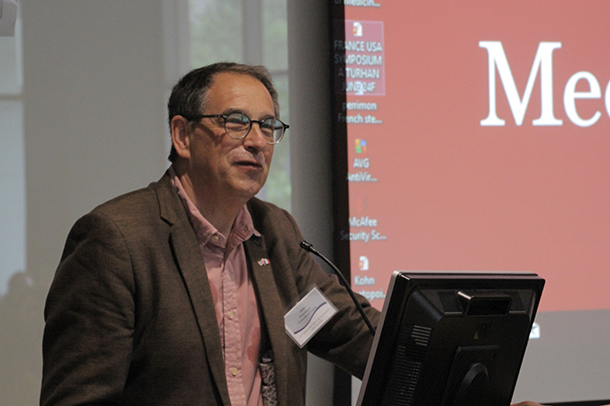Science was the common language at the first France-USA Stem Cell Symposium, held at the Eli and Edythe Broad CIRM Center for Regenerative Medicine and Stem Cell Research at USC. The event brought together more than 100 stem cell scientists from France and the United States on the eve of the field’s largest annual conference — the International Society for Stem Cell Research meeting, co-sponsored in 2019 by USC Stem Cell and the Choi family at the Los Angeles Convention Center.
The France-USA event was organized by the Scientific Office of the Embassy of France in the USA, the French Society for Stem Cell Research (FSSCR), ITMO BCDE, and the Eli and Edythe Broad Center for Regenerative Medicine and Stem Cell Research at USC.
“We decided that since the ISSCR 2019 conference would be held in L.A., it would be a very nice opportunity to have a symposium like this one,” said Jean Rosenbaum, the Scientific Attaché for the Consulate General of France in Los Angeles. “So everybody we asked to participate was very enthusiastic, so thank you to all of the speakers for being here today.”
Cécile Martinat from the FSSCR added, “We would like to promote the French community in this field at the international level, so that’s why we’re very proud today to be here.”
Keynote speaker Donald B. Kohn from UCLA kicked off the symposium by presenting his stem cell-based clinical trials for fatal immune disorders and sickle cell disease. Kohn’s team has cured more than 50 babies who lacked immune systems due to severe combined immune deficiency, known as “bubble baby disease,” by correcting a genetic mutation in their blood stem cells. Kohn is now applying the same approach to another immune disorder, called X-linked chronic granulomatous disease, as well as to sickle cell disease.
In a second keynote lecture, Silvia Fre from the Curie Institute in Paris discussed the role of environmental cues in stimulating healthy stem cells to contribute to the formation of colon cancer. Her lab was able to pinpoint key signals and molecules secreted by tumor cells, which can trigger cancer development in previously healthy mini-intestines, known as organoids, grown in the laboratory. This raises new challenges in finding and eradicating the cells involved in the progression of this very common type of cancer.
Keynote speaker Heinrich Jasper from Genentech in San Francisco closed the symposium with a talk about how stem cells age. By studying stem cells in the intestines of the fruit fly, Jasper has discovered insights into the regulation of key genes involved in the loss of regenerative ability due to aging.
Throughout the symposium, speakers from both sides of the Atlantic shared how stem cells are enhancing our understanding of a wide range of medical problems, including cancers, arthritis, muscular dystrophy, and diseases affecting the brain, heart, and kidneys.
“This has been a very exciting meeting with a very intense agenda,” said Andy McMahon, PhD, chair of stem cell biology and regenerative medicine at the Keck School of Medicine of USC and director of the Eli and Edythe Broad Center for Regenerative Medicine and Stem Cell Research at USC. “It’s been a pleasure to welcome our French colleagues to USC, and it’s been a valuable, enjoyable and collaborative experience to bring together leading scientists from our two nations.”
— Cristy Lytal


